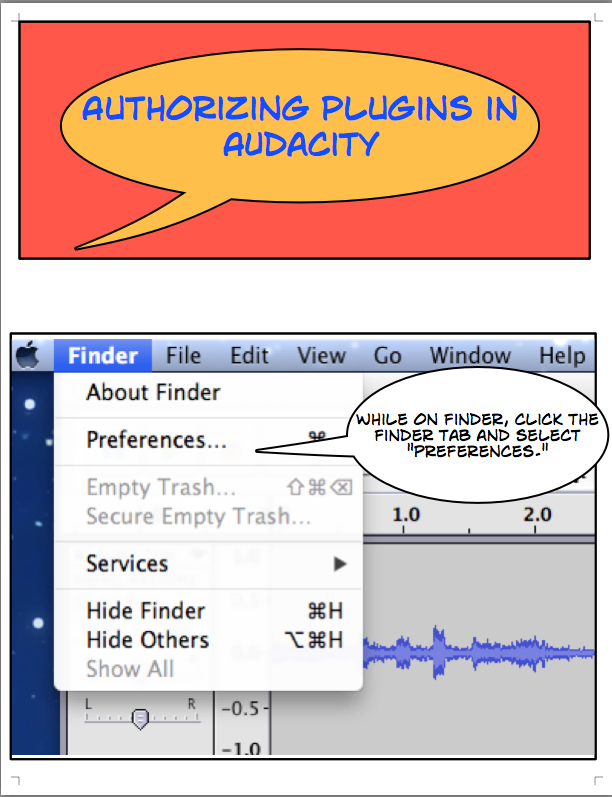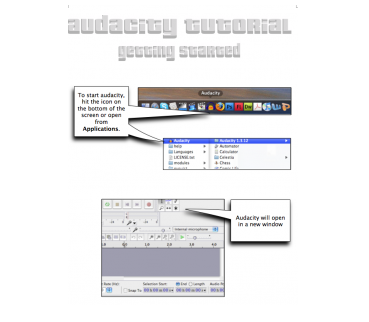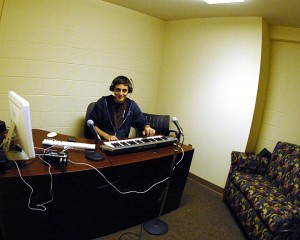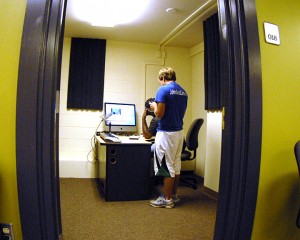Click the link below to find out how to authorize plugins in Audacity! This is especially helpful for exporting your Audacity project as an MP3.
Tag: audacity
 During the fall 2010 semester, Professor Sheri Lullo’s Introduction to the Arts of Asia course created podcasts using images of the pieces held by the Trout Gallery. The images were incorporated into Imovie and a narration was recorded over the video, walking the viewer through the history of each piece. Students took a slightly different approach to the assignment as is apparent when you watch some of the examples below. By incorporating storytelling, imagery, music and sound effects these beautiful examples of Asian art are brought to life.
During the fall 2010 semester, Professor Sheri Lullo’s Introduction to the Arts of Asia course created podcasts using images of the pieces held by the Trout Gallery. The images were incorporated into Imovie and a narration was recorded over the video, walking the viewer through the history of each piece. Students took a slightly different approach to the assignment as is apparent when you watch some of the examples below. By incorporating storytelling, imagery, music and sound effects these beautiful examples of Asian art are brought to life.
Japanese Print: “Beppu Kankaiji” by Kawase Hasui
Podcast By Brandon Howard
Chinese Lacquer Box
Podcast By Anne Newall
Buddha Statue: The Evolution of Buddhism
Podcast By Nickolas Baller
(iPOD broadCAST) An audio broadcast that has been converted to an MP3 file or other audio file format for playback in a digital music player. Although many podcasts are played in a regular computer, the original idea was to listen on a portable device; hence, the “pod” name from “iPod.” Although podcasts are mostly verbal, they may contain music, images and video.
Here at Dickinson, we have put the creation process into the hands of the students. Podcast projects have been effectively integrated into courses when students are assigned a particular topic to research. Often it is paired with a more traditional paper and the podcast serves as a public service announcement of sorts to make the information accessible & understandable to the general public. This also serves as an introduction to public speaking since the podcast must be delivered in an engaging, interesting manner to keep the listener connected to the topic. Dickinson professors & students have been podcasting for the past 5 years on any number of subjects. Any type of course has the potential for creating well written, informative & engaging podcasts. These projects are not limited to only upper level courses or specific disciplines. Podcasts have been created in First Year Seminars up to 400 level courses and in the humanities, social sciences & hard sciences.
Audience
Faculty and Students
Training Type
Instructor Led-Hands on
Time
45 minute in-class time
Workshop Outcomes
Upon completion of this workshop, you will:
- Know how to use the software programs Audacity, Garageband or IMovie to record & edit podcast
- Have observed a variety of course related podcast examples.
- Know best practices to use when writing script.
- Be provided online resources to help you get started finding creative commons audio, video or image files.
Want to know more? Contact mediacenter@dickinson.edu to set up a consultation. You can also get a sneak peek of what we cover in our training by looking over our
Examples
Quantum Connections
Topic: Time Travel
Very Creative Style-Role Playing
Professor David Jackson
Physics- First Year Seminar-Quantum Mechanics
Quantum Connections: Where we discuss some of the strange and fascinating features of Quantum Mechanics.
The Shoulders of Giants
Topic: The Square root of two
Complex topic described in interesting way so people can understand and connect with topic-good intro
Professor Dave Richeson-Mathematics
Course: Great Theorems & Ideas in Math
The “Shoulders of Giants” podcasts profile history’s greatest mathematicians.
Creative Geniuses & Their Rivalries
Topic: The Battle of the Currents
Storytelling style-Dark-Took different path than what most would have chosen to describe electricity
Professor Barry Tesman-Mathematics-First Year Seminar
Creative Geniuses & Their Rivalries: One could argue that most progress, in many fields of endeavor, has come about because of rivalry. Whether in science, art, or sports, recognition or competition to be first or best has been the driving force for many people. In addition, these people of accomplishment have led lives that one would not consider, in the words of George Bernard Shaw, reasonable.
“The reasonable man adapts himself to the world; the unreasonable one persists in trying to adapt the world to himself. Therefore, all progress depends on the unreasonable man.” – George Bernard Shaw
Moving at the Speed of Science
Topic: Commercial Space Travel
Fast, fun, engaging. Good use of sound effect (but not overused)
Professor Missy Niblock-Biology
Course: Writing Science News
Moving at the Speed of Science
Great Secular Jews in History
Topic: Albert Einstein
Well thought out. Great use of sound effects/music to evoke feeling of piece
Professor Ted Merwin-Religion
Course: Jewish Identity in a Secular Age
Great Secular Jews in History
Atlantic Slave Trade
Topic: Carolina Low Country
Great use of music, description to give mental picture.
Professor Jeremy Ball-History
Course-Atlantic Slave Trade
 Untold Stories of Disease and Disability
Untold Stories of Disease and Disability
Topic: Schizophrenia
Use of an interview clip. Public service announcement example.
Professor Dan Schubert-Sociology
Course: Sociology of Health and Illness
“Untold Stories: Raising Awareness about Disease and Disability” is a series of podcasts recorded by students in Professor Dan Schubert’s “Sociology of Health and Illness” class. Through research and interviews, the recordings give background on specific illnesses and how they affect those afflicted.
Sustainability-Red Bikes
ARTH 110: Introduction to the Arts of Asia
Topic: Japanese Print from Trout Gallery
Using narration over images. Created using IMovie & series of images from Trout Gallery of Creative Commons files.
Professor: Sheri Lullo-Art History
Course:ARTH 110: Introduction to the Arts of Asia
Kawase Hasui – Beppu Kankaiji
Over the summer, the Media Center went though a redesign and part of it was creating more sound buffered booths (they aren’t quite ‘sound proof’) that can be used for skyping, interviews, podcasts or music creation. Since there weren’t other places on campus that had spaces where people could easily record music (without getting in trouble for being too loud) our Podcast nooks have become quite popular. The rooms are outfitted with soundproofing materials on the walls and door and are equip to record through 2 microphones for voice or instruments, 1 mini mixer, 1 keyboard, and 1 iMac using recording apps, such as Garageband, Audacity, & IMovie. The rooms can be reserved for use by emailing mediacenter@dickinson.edu.













